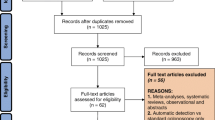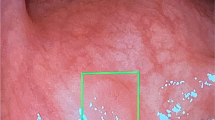Abstract
Background
Colonoscopies have long been the gold standard for detection of pre-malignant neoplastic lesions of the colon. Our previous study tried real-time artificial intelligence (AI)-aided colonoscopy over a three-month period and found significant improvements in collective and individual endoscopist’s adenoma detection rates compared to baseline. As an expansion, this study evaluates the 1-year performance of AI-aided colonoscopy in the same institution.
Methods
A prospective cohort study was conducted in a single institution in Singapore. The AI software used was GI Genius™ Intelligent Endoscopy Module, US-DG-2000309 © 2021 Medtronic. Between July 2021 and June 2022, polypectomy rates in non-AI-aided colonoscopies and AI-aided colonoscopies were calculated and compared. Some of the AI-aided colonoscopies were recorded and video reviewed. A “hit” was defined as a sustained detection of an area by the AI. If a polypectomy was performed for a “hit,” its histology was reviewed. Additional calculations for polyp detection rate (PDR), adenoma detection rate (ADR), and adenoma detection per colonoscopy (ADPC) were performed. Cost analysis was performed to determine cost effectiveness of subscription to the AI program.
Results
2433 AI-aided colonoscopies were performed between July 2021 and June 2022 and compared against 1770 non-AI-aided colonoscopies. AI-aided colonoscopies yielded significantly higher rates of polypectomies (33.6%) as compared with non-AI-aided colonoscopies (28.4%) (p < 0.001). Among the AI-aided colonoscopies, 1050 were reviewed and a final 843 were included for additional analysis. The polypectomy to “hit” ratio was 57.4%, PDR = 45.6%, ADR = 32.4%, and ADPC = 2.08. Histological review showed that 25 polyps (3.13%) were sessile-serrated adenomas. Cost analysis found that the increased polypectomy rates in AI-aided colonoscopes led to an increase in revenue, which covered the subscription cost with an excess of USD 20,000.
Conclusion
AI-aided colonoscopy is a cost effective means of improving colonoscopy quality and may help advance colorectal cancer screening in Singapore.
Similar content being viewed by others
References
Winawer SJ, Zauber AG, Ho MN, O’Brien MJ, Gottlieb LS, Sternberg SS et al (1993) Prevention of colorectal cancer by colonoscopic polypectomy: the National Polyp Study Workgroup. N Engl J Med. 329(27):1977–1981
Lee JK, Jensen CD, Levin TR, Doubeni CA, Zauber AG, Chubak J et al (2020) Long-term risk of colorectal cancer and related death after adenoma removal in a large, community-based population. Gastroenterology. 158(4):884–894
Kaminski MF, Wieszczy P, Rupinski M, Wojciechowska U, Didkowska J, Kraszewska E et al (2017) Increased rate of adenoma detection associates with reduced risk of colorectal cancer and death. Gastroenterology. 153(1):98–105
Millan MS, Gross P, Manilich E, Church JM (2008) Adenoma detection rate: the real indicator of quality in colonoscopy. Dis Colon Rectum. 51(8):1217–1220
Kaminski MF, Regula J, Kraszewska E, Polkowski M, Wojciechowska U, Didkowska J et al (2010) Quality indicators for colonoscopy and the risk of interval cancer. N Engl J Med. 362(19):1795–1803
Wang P, Berzin TM, Glissen Brown JR, Bharadwaj S, Becq A, Xiao X et al (2019) Real-time automatic detection system increases colonoscopic polyp and adenoma detection rates: a prospective randomised controlled study. Gut. 68(10):1813–1819
Wang P, Liu X, Berzin TM, Glissen Brown JR, Liu P, Zhou C et al (2020) Effect of a deep-learning computer-aided detection system on adenoma detection during colonoscopy (CADe-DB trial): a double-blind randomised study. Lancet Gastroenterol Hepatol. 5(4):343–351
Gong D, Wu L, Zhang J, Mu G, Shen L, Liu J et al (2020) Detection of colorectal adenomas with a real-time computer-aided system (ENDOANGEL): a randomised controlled study. Lancet Gastroenterol Hepatol. 5(4):352–361
Leung FW, Hsieh YH (2021) Artificial intelligence (computer-assisted detection) is the most recent novel approach to increase adenoma detection. Gastrointestinal Endoscopy 93:86–88
Litjens G, Kooi T, Bejnordi BE, Setio AAA, Ciompi F, Ghafoorian M et al (2017) A survey on deep learning in medical image analysis. Medical Image Analy. 42:60–88
Jiang F, Jiang Y, Zhi H, Dong Y, Li H, Ma S et al (2017) Artificial intelligence in healthcare: past, present and future. Stroke Vasc Neurol. 2:230–243
Alagappan M, Brown JRG, Mori Y, Berzin TM (2018) Artificial intelligence in gastrointestinal endoscopy: the future is almost here. World J Gastrointest Endosc. 10(10):239–249
Hosny A, Parmar C, Quackenbush J, Schwartz LH, Aerts HJWL (2018) Artificial intelligence in radiology. Nat Rev Cancer 18:500–510
Chan HP, Hadjiiski LM, Samala RK (2020) Computer-aided diagnosis in the era of deep learning. Med Phys. https://doi.org/10.1002/mp.13764
Koh FH, Ladlad J, SKH Endoscopy Centre, Teo EK, Lin CL, Foo FJ (2022) Real-time artificial intelligence (AI)-aided endoscopy improves adenoma detection rates even in experienced endoscopists: a cohort study in Singapore. Surg Endosc 37(1):165–171. https://pubmed.ncbi.nlm.nih.gov/35882667/
Rex DK, Schoenfeld PS, Cohen J, Pike IM, Adler DG, Fennerty MB et al (2015) Quality indicators for colonoscopy. Gastrointest Endosc. 81(1):31–53
Repici A, Badalamenti M, Maselli R, Correale L, Radaelli F, Rondonotti E et al (2020) Efficacy of real-time computer-aided detection of colorectal neoplasia in a randomized trial. Gastroenterology 159(2):512–520
Hassan C, Spadaccini M, Iannone A, Maselli R, Jovani M, Chandrasekar VT et al (2021) Performance of artificial intelligence in colonoscopy for adenoma and polyp detection: a systematic review and meta-analysis. Gastrointest Endosc 93:77–85
Doubeni CA, Corley DA, Quinn VP, Jensen CD, Zauber AG, Goodman M et al (2018) Effectiveness of screening colonoscopy in reducing the risk of death from right and left colon cancer: a large community-based study. Gut. 67(2):291–298
Zauber AG, Winawer SJ, O’Brien MJ, Lansdorp-Vogelaar I, van Ballegooijen M, Hankey BF et al (2012) Colonoscopic polypectomy and long-term prevention of colorectal-cancer deaths. N Engl J Med. 366(8):687–696
Niikura R, Hirata Y, Suzuki N, Yamada A, Hayakawa Y, Suzuki H et al (2017) Colonoscopy reduces colorectal cancer mortality: a multicenter, long-term, colonoscopy-based cohort study. PLoS One. 12(9):e0185294
Lieberman DA, Weiss DG, Bond JH, Ahnen DJ, Garewal H, Chejfec G (2000) Use of colonoscopy to screen asymptomatic adults for colorectal cancer: Veterans Affairs Cooperative Study Group 380. N Engl J Med. 343(3):162–168
Shah SK, Narcisse M-R, Hallgren E, Felix HC, McElfish PA (2022) Assessment of colorectal cancer screening disparities in US men and women using a demographically representative sample. Cancer Res Commun. 2(6):561–9
Redaelli A, Cranor CW, Okano GJ, Reese PR (2003) Screening, prevention and socioeconomic costs associated with the treatment of colorectal cancer. PharmacoEconomics. 21:1213–1238
Zhang J, Chen G, Li Z, Zhang P, Li X, Gan D et al (2020) Colonoscopic screening is associated with reduced colorectal cancer incidence and mortality: a systematic review and meta-analysis. J Cancer. 11(20):5953–5970
Acknowledgements
G Khasthuri, SKH Endoscopy Center members (Fung-Joon Foo, Winson J. Tan, Sharmini S. Sivarajah, Leonard M. L. Ho, Jia-Lin Ng, Frederick H. Koh, Cheryl Chong, Darius Aw, Juinn-Haur Kam, Alvin YH Tan, Tousif Kabir, Choon-Chieh Tan, Baldwin P. M. Yeung, Wai-Keong Wong, Bin-Chet Toh, Lester WL Ong, Jason Barco, Hui-Wen Chua, Faith Leong, Christopher Kong, Cui-Li Lin, Eng-Kiong Teo, Yi-Kang Ng, Tze-Tong Tey, Marianne A. De-Roza, Jonathan Lum, Xiaoke Li, Jin-liang Li, Pei-Shi Goh, Nazeemah B. Mohd-Nor, Siok-Peng Ng).
Funding
No funding was provided for this study.
Author information
Authors and Affiliations
Consortia
Corresponding author
Ethics declarations
Disclosures
Dr Frederick H Koh is a Key-Opinion-Leader for Medtronic for AI in Endoscopy, Asia Pacific Region. Chin Shuen Ern, Wan Fang Ting, Dr Jasmine Ladlad, Dr Eng-Kiong Teo, Dr Cui-Li Lin, Dr Fung-Joon Foo and co-authors within SKH Endoscopy Center have no conflicts of interest or financial ties to disclose.
Additional information
Publisher's Note
Springer Nature remains neutral with regard to jurisdictional claims in published maps and institutional affiliations.
The members of SKH Endoscopy Centre group are listed in Acknowledgements.
Rights and permissions
Springer Nature or its licensor (e.g. a society or other partner) holds exclusive rights to this article under a publishing agreement with the author(s) or other rightsholder(s); author self-archiving of the accepted manuscript version of this article is solely governed by the terms of such publishing agreement and applicable law.
About this article
Cite this article
Chin, SE., Wan, FT., Ladlad, J. et al. One-year review of real-time artificial intelligence (AI)-aided endoscopy performance. Surg Endosc 37, 6402–6407 (2023). https://doi.org/10.1007/s00464-023-09979-8
Received:
Accepted:
Published:
Issue Date:
DOI: https://doi.org/10.1007/s00464-023-09979-8




